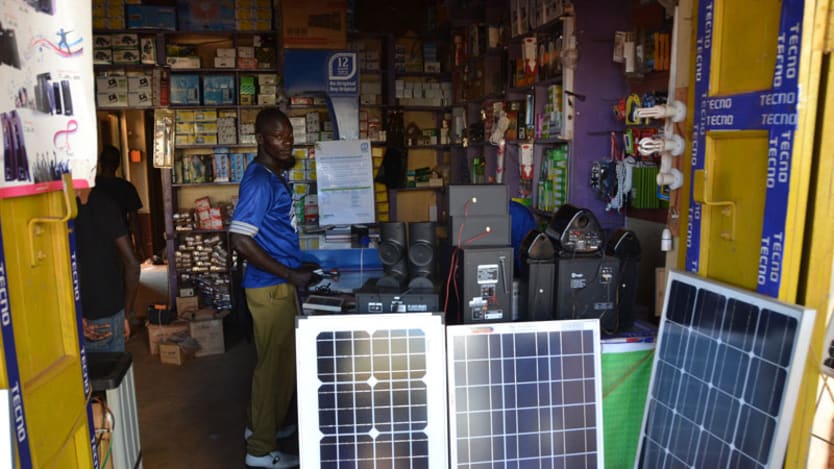
BRUSSELS — Entrepreneurs have new ideas; they challenge established firms to be more innovative; and they try to find ways around systemic problems such as weak infrastructure, Jean-Philippe Stijns, a senior economist at the European Investment Bank, told a seminar in Brussels earlier this year. Entrepreneurs contribute to economic transformation; create and import new technologies; contribute to the tax base; and, crucially, they also create jobs, Stijns added.
More on entrepreneurship:
► The 2 women entrepreneurs tackling maternal mortality in Nigeria
► 5 barriers holding back fintech entrepreneurs
► Are women entrepreneurs the key to global economic development?
With 29 million Africans expected to join the labor market each year between 2015 and 2030, encouraging entrepreneurs into productive sectors is not a choice but a necessity, he said.
“Survival entrepreneurs” — who would work for the public sector or a company if they could — need microfinance, vocational training, and technical assistance to help them tap into the traditional banking sector, Stijns said. By contrast, “high-potential entrepreneurs” — who offer new products for unmet needs and are capable of creating new market sectors and jobs — are more likely to need angel funding, incubators, and follow-up funds, including private equity.
While selectively supporting the high-potential group, Stijns argued development donors must not forget the long tail of survival entrepreneurs. It is the latter who are likely to generate the most employment, he said. Just 17 percent of African entrepreneurs expect to create six or more jobs in the next five years, according to Global Entrepreneurship Monitor data. It is also survival entrepreneurs who are most likely to suffer from “bottlenecks” in formalization, market access, skills training, and a poor overall business environment and governance, Stijns said.
“Think about a lady baking wonderful cakes at home and distributing them in her own community,” he said. “She may or may not have the prospect of growing big and being the pie monster of Central Africa but her livelihood is still highly respectable and we should feel proud to be able to help sustain her business, no matter how big it is expected to grow.”
EIB funds microfinance institutions and commercial banks who on-lend to micro, small and medium enterprises. The EIB’s Boost Africa initiative, together with the African Development Bank, provides an investment program, technical assistance, and access to an innovation and information lab, designed to facilitate international connections for young entrepreneurs with research centers, universities, corporations, and investors.
An appreciation of the local context is key, Stijns added. In Ethiopia, for instance, despite low per capita gross domestic product, close to 70 percent of entrepreneurs are considered “opportunity-driven” — that is, seeking to pursue a new market, rather than simply get by. But in South Africa, “arguably the most developed country on the continent,” less than 40 percent of entrepreneurs are considered opportunity-driven.
The sectors of entrepreneurship also deserve attention. The 2017 African Economic Outlook found that 55 percent of early-stage African entrepreneurs work in retail trade, hotels, and restaurants, with the next highest sector of agriculture, forestry, and fishing accounting for just 10 percent, and manufacturing 8 percent. Stijns said that needs to change to drive overall improvements in productivity and wages growth. “Whenever we discuss entrepreneurship, issues of economic transformation and diversification are not lurking far behind,” he said.
Devex caught up with Stijns to discuss his work, and why he is particularly optimistic about the future of African agribusiness.
The conversation has been edited for length and clarity.
What are the different types of entrepreneur?
It is a catch-all term that encompasses a wide variety of economic realities, from a lady in a shack sewing garments she’s going to sell in her neighborhood and perhaps to her family, all the way to larger African firms fighting in a space similar to some of the fintechs or dotcoms in advanced economies.
Typically, the smaller the entrepreneurs you are talking about, the more you are talking about lending and lines of credit. Generally, the more sophisticated and bigger the startups, the more you are going to need equity and capital-at-risk.
The most popular sector for African entrepreneurs at present is retail, hotels, and restaurants. Does that need to change? If so, into which areas?
We certainly wish many sub-Saharan African countries, in particular, would focus on a faster process of economic transformation, including the reorientation of resources and labor from low productivity to high productivity, from low-innovation to high-innovation sectors. These are very broad categories, but we’d like to see some of the retail, hotel, and restaurants category workers migrate to manufacturing, for instance.
Any attempt at improving productivity and therefore wages and inclusive growth in Africa will take a combination of two things: One, increasing productivity across all sectors, and here the business climate and good governance agenda kicks in. And two, a degree of economic transformation and reshuffling of activity toward more productive sectors.
What makes you optimistic about the potential of agribusiness in Africa?
There is a porous border between manufacturing and agriculture, with agribusiness in the middle. From observations on the ground, looking at some of those businesses and some of the numbers, this is one of the areas where I think there is greatest potential in many countries in sub-Saharan Africa.
Local transformation of local goods, agricultural goods included, is both a real prospect and one that has further to go. I’ve seen palm oil refineries and juice concentrate factories that are the beginning of transformation and are relatively low-hanging fruit in terms of the creation of a manufacturing sector. If properly supported they could create a real ascent in global value chains by African countries and the birth of a middle class.
There are larger SMEs working in agribusiness that seem to be sitting on a viable and sustainable market segment. The technology seems to be transferable enough so that now it is more economically profitable to do everything in Africa, rather than shipping mangoes from Côte d’Ivoire all the way to Germany and then shipping the juice back, for instance. If you look at intra-African export growth, agribusiness is one of the highest subsectors.
There are obviously huge question marks in terms of providing the infrastructure that is needed to export those goods, especially inside Africa, and lingering questions about governance and political stability. But I read the tea leaves as saying that on average — with a few steps back here and there — the business climate is improving in Africa rather than the opposite.








